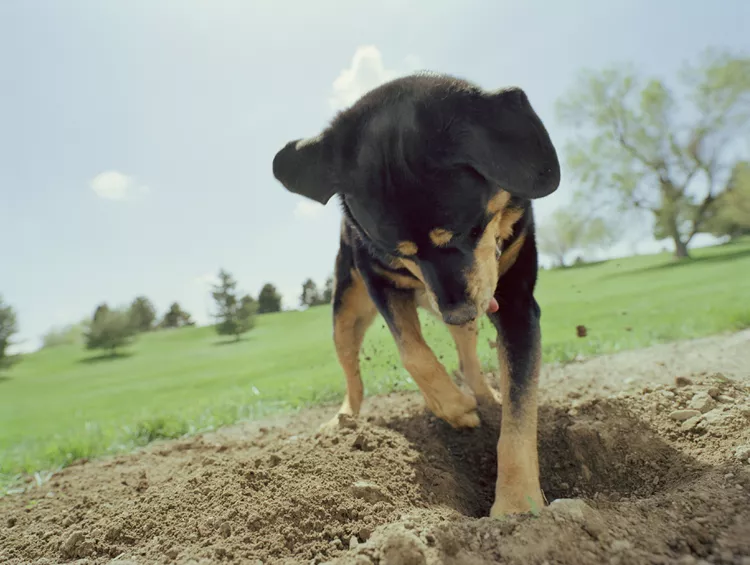Why Dogs Bury Bones and Other Objects

Have you ever given your dog a bone only to watch him head to the couch or outside in the garden to bury it? Many dogs like to hide things in safe places and often dogs are predisposed to bury items that belong to them, and sometimes items that do not. Discover four reasons why this behavior occurs, and how or if you should stop it.
Instinct
This behavior may have developed due to strong survival instincts inherited from the domesticated dogs' wild ancestors, wild dogs and the gray wolf. Food was not always the easiest to come by and to make the most of the food they had, these wild dogs would often bury the excess in the ground near their dens. The soil acts as a natural refrigerator by keeping the meal away from direct sunlight and the temperature of the earth decreases with the depth of the hole, keeping food fresher longer, so the animal can retrieve it later when nourishment is scarce. This also reduced the smell, keeping other predators away from their leftovers.
Dogs may bury anything they consider valuable, which does not just include food. This is due to their natural instinct to keep valuable things safe and protected.
Breed
There are several breeds that are more predisposed to digging and burying than others. A few of these breeds are Terriers, Dachshunds, Beagles, Basset Hounds and Miniature Schnauzers. Cairn Terriers, for instance, were originally bred to chase and hunt small game, and they have maintained their excellent digging skills and their instinct to search. Since these breeds are bred specifically to dig, they may also have a heightened desire to save their resources, and therefore are more likely to bury bones. They also have an instinct to hunt out small rodents, so they often dig when they pick up a scent and are tracking a rodent. This is a normal behavior for them. Remember, regardless of a dog’s breed, all dogs have the potential to dig.
Boredom
Dogs need stimulation and outlets for their energy every day and when humans do not provide it for them, they will find their own ways to occupy themselves. An example may be the fun game of stealing a tv remote and burying it to get your attention (an attention seeking behavior) and to add some variety to their routines.
Anxiety
Stress and anxiety can play a part in this behavior as well. Some dogs that are feeling anxious may bury items to calm themselves since digging is a self-soothing behavior. If a dog does not feel safe at the moment or in the area they are fed in, they may bury their food to eat in a more comfortable place or time. You may also see more of this behavior in multi-dog households, or among dogs that grew up in situations where they had scarce resources and a lot of competition for food, such as in a puppy mill. This can also be a sign of more severe anxiety, such as obsessive-compulsive behavior in which a dog repeats the same behavior to a concerning degree.
This behavior may improve once your dog feels safe and is fed on a consistent schedule, but if not, it is suggested to seek advice from your veterinarian and behavior professionals.
How to Stop Burying
Remember, burying behavior can occur for a multitude of reasons and motivation can include boredom, anxiety, and the natural urge to hide things in safe places. It's a normal behavior when done appropriately.
To minimize this behavior, be sure to provide lots of scheduled walks, play time, positive training techniques, and other appropriate outlets for your dog’s energy. Keep fun toys out to keep your dog busy when you are not around. Kong toys filled with treats or food puzzle toys work especially well. Be sure to rotate the toys to keep things interesting.
You can also convert the whole act of burying into a fun indoor game that you play a few times during the week with your dog. This is recommended because it's your dog's natural instinct to bury, so you are providing appropriate opportunities for your dog to bury what you ask him to (rather than your tv remote controller). This game will enrich your dog with a new learning of what is okay to hide and what is not.
If you have multiple dogs in the home, it may be helpful to separate them during certain playtimes or when they have some of their favorite toys and treats to reduce the threat of competition. If they are alone, they may be able to enjoy their special treat without the worry of another dog stealing it, reducing their urge to bury it.
If your dog is burying your items or burying their toys out of boredom, do the following:
- In an upbeat tone, call your dog’s name to get their attention.
- Redirect your dog to an appropriate digging area, a different game to play, or other compatible behavior and reward.
Lastly, limit your dog’s access to all of their toys and leave out only a few at a time so that they become interested in the toys that are available for them. By limiting the quantity and providing variety, you may lessen your dog’s urge to take their treasures out into the yard and bury them.